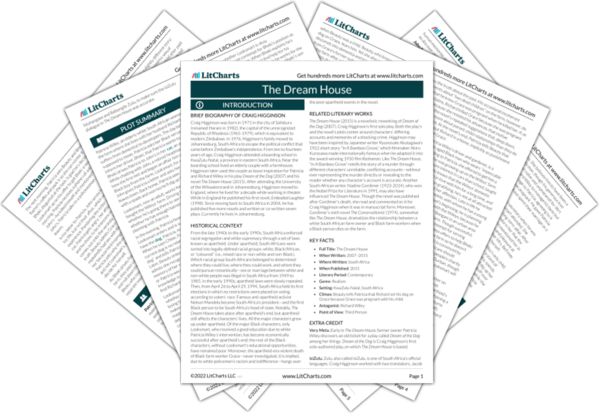Characters in The Dream House use humor to connect with one another but also to silence, deflect, or deny painful realities. Ultimately, therefore, the novel suggests that humor should not be one’s only mode of interacting with other people; to face reality, one has to be serious sometimes. Two of the novel’s central characters are the white South African farm owner Patricia Wiley and the Black South African man Looksmart, whose education Patricia paid for while he was growing up on her farm. Looksmart grew up during apartheid, a period of racial segregation and legally enforced white supremacy in South Africa. During Looksmart’s childhood, strict laws and social mores surrounding racial hierarchies shaped how Patricia and Looksmart could interact. Patricia used humor and “teasing” to demonstrate her quasi-maternal love for Looksmart in place of overt affection, which was disallowed between white and non-white people. In turn, Looksmart learned to tease her back. Humor thus enabled them to connect with each other, but it also helped Patricia ignore how racism affected their relationship. Similarly, Patricia uses humor to “silence” her husband Richard, which helps her cope with his unpleasantness but also blinds her to how horrible he truly is. Patricia doesn’t know that Richard murdered Grace, the girl that Looksmart loved—an event leading Looksmart to flee the farm. It is only after Looksmart returns many years later and has a serious conversation with Patricia about Grace—a conversation in which they laugh painfully or cynically at each other but never at each other’s jokes—that Patricia can finally recognize the realities that shaped and ultimately ended her quasi-maternal relationship with Looksmart.
Humor, Ignorance, and Denial ThemeTracker

Humor, Ignorance, and Denial Quotes in The Dream House
“Are we dead yet?”
“No.”
“You will tell me when we’re dead?”
“If I can, Roo, I will.”

Unlock explanations and citation info for this and every other The Dream House quote.
Plus so much more...
Get LitCharts A+She has many strategies to silence him. One of them, and often the most effective, is wit.
As she speaks, she recalls the times he used to tease her, when teasing—no doubt learned in part from her—was the mode between them. At the time, their world seemed to permit little else: it didn’t even allow them to touch. But now there is no affection in this echo of their old style. Today everything between them seems to bristle with innuendo and hurt.
As they labour along the road, the image of the black puppy keeps finding its way back into her head: the way it would run along the fence of the dog-run after the girls going toward the dairy, stumbling over its paws, while she sat back and laughed at it.











